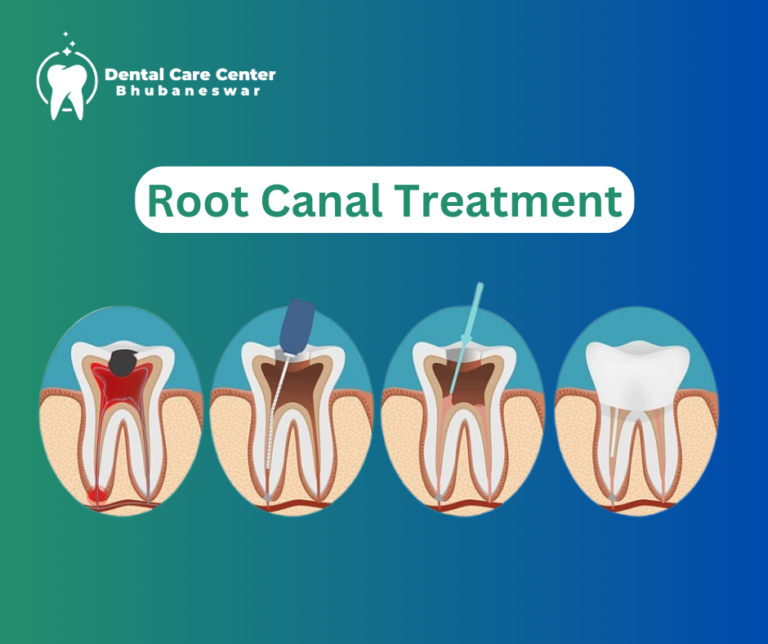
As an experienced dental professional, I have seen how a root canal treatment can be life-changing. It’s a technique that relieves severe toothache and at the same time restores the health and use of your smile. This all-inclusive guidebook will explain everything about root canal treatment, demystify common misunderstandings around it, and enlighten you for good decision-making about your dental well-being.
What is Root Canal Treatment?
Root canal treatment, or endodontic treatment, is a dental procedure that involves removing the infected or inflamed pulp (the soft innermost part of the tooth) and sealing off any further harm caused by infection. It helps save teeth that are damaged by decay or injury.
Irritation by deep cavities, repeated dental procedures as well as cracked teeth among others causes infection of nerves and blood vessels in the pulp. If not treated immediately this might extend to surrounding gums and bones resulting in more complex issues
When is root canal treatment necessary?
In most cases, there is a need for root canal treatment if there’s an infection or inflammation in the pulp of a tooth. These are some things that cause it:
Deep Cavities: Untreated cavities get into the inner parts of teeth letting bacteria thrive inside pulps resulting in their infections.
Repeated Dental Procedures: Too much filling weakens structures resulting in easy infections because they have lower defences each time another drilling exercise takes place within these regions.
Tooth trauma (cracks, chips, injuries etc.) exposes nerves hence attracting germs which lead to swelling with pus beneath crowns necessitating such intervention too.
Severe Tooth Decay: Including others that had entirely been invaded by decay within their internal layers meaning none of those pulps remained viable.
In case these conditions affect you then find yourself at the dentist’s office right away for fast mediation
Signs & Symptoms of Root Canal Infection
While different signs and symptoms may occur when one has root canal infections, the following are some of the typical ones:
- Persistent pain or severe toothache
- Hot/cold sensitivity
- Swelling around the gums near an infected tooth
- Tooth discolouration, especially blackish hues
- A small pimple-like bump on gum adjacent to an affected tooth, among others.
You must make a date as soon as warning signs manifest so that it is easier to deal with current issues and reduce the chances of later events turning into complex issues.
Root Canal Treatment Procedure
The following steps are usually involved during root canal treatment:
Consultation and Diagnosis: The dentist checks your teeth, takes X-rays and then determines whether or not a root canal should be done based on their findings afterwards.
Anaesthesia: To ensure the patient remains comfortable throughout this process, numbing of the affected area is done through injections before surgery commences.
Pulp Removal: While removing decayed tissues from within after drilling into rotten parts thereby widening them out; by cleaning all these areas until they are completely free of harmful microorganisms responsible for such infections; shaping them accordingly in readiness for filling operations subsequently.
Restoration: Depending on how severely it is damaged, this tooth may require a crown or other restorative treatment to protect it and restore its function.
Usually, your dentist will tell you what to do afterwards in detail and the whole process can take one or two appointments with him/her.
Advantages of Root Canal Treatment
Some of the benefits associated with having a root canal treatment include:
Alleviates Pain: The pain that results from a root canal infection, which can be relieved by removing infected or inflamed pulp through a root canal procedure.
Preserving Teeth: It is always better to save natural teeth than have them extracted; thus, root canal treatments help in preserving the teeth.
Healed Functioning: After this procedure has been done, the tooth will regain its normal use hence enabling you to chew without difficulty.
Enhanced Beauty: Supporting a smooth smile for your teeth could match an affected tooth back to health following a root canal, hence enhancing beauty for your teeth.
Prevent Complications: When ignored at early stages of development, infections can spread into neighbouring tissues causing serious health problems therefore timely root canal treatment prevents these incidences from happening.
Finding an Endodontic Dentist in Bhubaneswar
If you ever need an endodontic treatment while in Bhubaneswar, you must identify an accomplished dentist offering outstanding services thereat.
Tips for choosing the right specialist are as follows:
Seek Referrals: Inquire from relatives, friends and regular dentists about reputable dental professionals practising endodontics in the Bhubaneswar area.
Go through their Credentials: Find out if he/she has a valid license and enough experience as well as previous successful cases attended during his/her practice of being an endodontist.
Consider Convenience: Some may prefer finding someone whose office location fits within where they live or work so well such that they can easily make visits without interfering too much with their schedules among other commitments within their daily routines.
Evaluate the Facility: The cleanliness levels maintained, modern equipment availability for efficient service delivery and overall patient-friendly environment that is comfortable enough to provide treatment in such a facility should be checked while visiting the dental office.
By following these guidelines and devoting adequate time when searching for an endodontic dentist located within Bhubaneswar city bounds, they are guaranteed that they shall benefit from this specific type of dental care provision in this area.
Tips on How to Get Healed Successfully After Root Canal Treatment
After your root canal treatment, you must follow all instructions given by the doctor about postoperative care to achieve good healing results as well as the long-term success of the therapy. These include:
Follow Prescription: Ensure that you adhere strictly to what your physician has prescribed such as painkillers or antibiotics, so these drugs have been given to manage pain effectively and prevent infection respectively.
Don’t Bite on Treated Tooth: This is necessary until the final restoration is done because further damage may arise from chewing forces that will be acting directly overfilled root canals, leading to breakage again or becoming loose thereby causing re-treatment later on.
Maintain Good Oral Hygiene: Keep brushing your teeth as normal but add to it by flossing the area around the treated tooth the same way other parts of your mouth should always be kept clean not only during but even after therapy itself. Where possible, this should remain a lifetime habit since prevention is better than cure for subsequent infections thereabouts when such have been carried out before now.
Attend Dental Appointments: After having undergone root canal surgery, it is advised that you visit your dentist at least twice annually no matter how everything seems fine. Follow-up visits help in monitoring healing and catching early any potential problems before they deteriorate into serious conditions which might require more complex treatment later.
Raise Concerns Immediately: For example, if after some time upon finishing the treatment, there are signs like lingering pain, swelling, or any other abnormality around an area where a given procedure had been performed, do not hesitate to contact him/her without delay so that action can be taken sooner rather than later.
Follow these tips for taking care of your teeth after a root canal and you will increase your chances of success with the procedure.
Common Misconceptions And Myths About Root Canal Treatment
Despite all the advances in dental technology and scientific proof of its benefits, there are many misconceptions surrounding this procedure. Below are some of them.
Myth 1: It’s painful to get a root canal. While at one stage in history, it was known as one of the most excruciating procedures ever invented through new methods and anaesthesia this has become one of the most comfortable ones. You may find yourself experiencing more pain before getting treated with a root canal than during treatment itself.
Myth 2: Root canals make people sick. This myth stating that root canals cause systemic illnesses or diseases is unfounded; it has been thoroughly debunked by both the dental and medical communities for many years now.
Myth 3: This Procedure Is Unnecessary Sometimes individuals may think that they can live without their teeth being saved through such processes but later on realize that things get worse resulting in even possible loss of whole teeth if left untreated making them wrong again in thinking so. Sometimes ignoring a decayed tooth which is infected might lead to other serious problems too.
Myth 4: Root Canal Treatments Are Expensive Indeed yes! The price of root canal therapy is much more than any other type of dental work up front thus at first glance it seems expensive. However, this should not discourage anyone from proceeding with it because if you do not extensive and costly dental interventions may be required which will eventually cost more money than could have been incurred on initial RCTs (Root Canal Treatments).
Misconceptions about Root Canal Treatment
This article aims to debunk the myths surrounding root canal treatment so that readers can make the right choices concerning their oral health. It also highlights the importance of root canal therapy, in cases where tooth extraction would have been a viable option.
Alternatives to Root Canal Treatment
Sometimes other dental interventions may be more effective than going through this procedure. These alternatives include:
Tooth Extraction: Extraction is inevitable when there is severe damage or decay of a tooth, which is beyond repair even after endodontic treatments.
Dental Implants: The dentists will remove your natural teeth and replace them with implants that behave like normal teeth hence assisting in chewing food properly among other functions.
Bridge: There could well be bridges for instance that become false teeth which are attached to healthy neighbouring ones rather than being implanted directly into gums if someone misses several adjoining teeth in an accident.
Therefore, you can discuss this with your dentist who will advise you accordingly depending on your overall dental status and also consider general mouth cleanliness practices.
Conclusion: Embracing Healthy Smiles through Root Canal Treatment
Root canal treatments are still vital since they assist in preserving natural dentition as well as promoting body wellness generally.
It’s then possible for us never to undergo any painful smiles anymore as long as we understand how these work, what good comes out of it and what misgivings lie around them all thereby helping people to choose correctly regarding oral healthcare.
In case of a severe toothache or suspicion of root infections in Bhubaneswar town, visit a good dentist promptly without any delay. Call now for better oversight over our oral welfare thus forever saying goodbye to agonizing hollows.
You can choose us for your root canal treatment.
Dr Sangeeta Das
Dental Care Center Bhubaneswar
Plot 214, Lane 14, AIIMS Nagar, Near AIIMS Hospital, Patrapada, Bhubaneswar. Pin: 751019
Phone Number: 976 976 7506
Website: dentalcarecenterbhubaneswar.com
Email: hezitt@outlook.com
